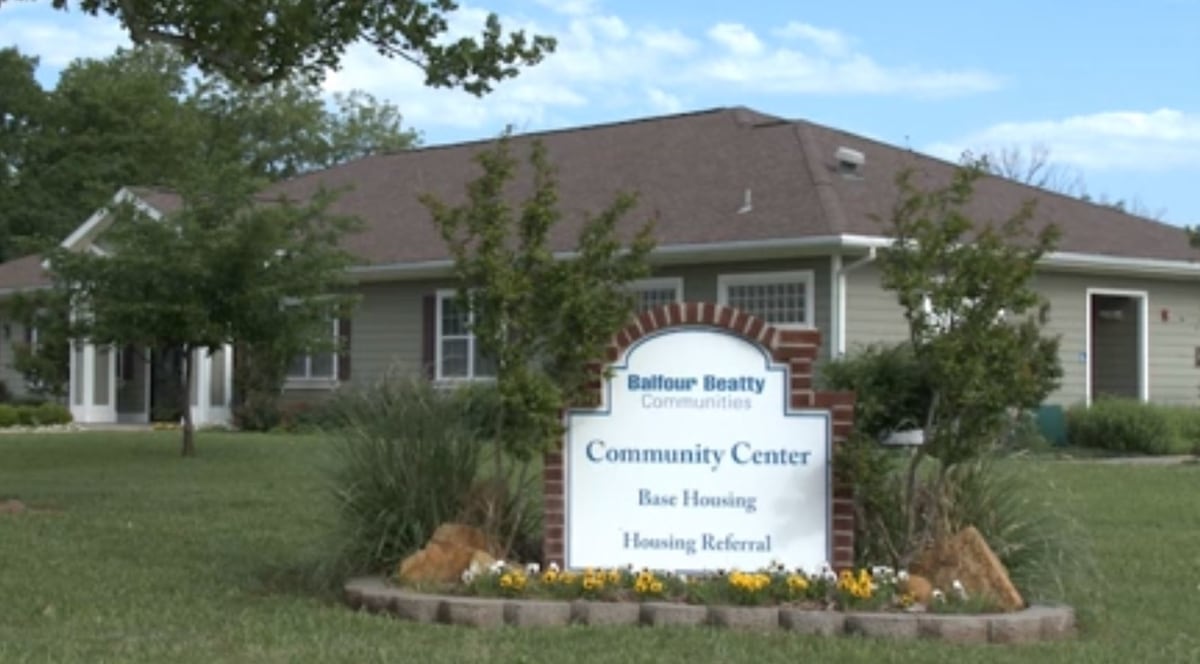A privatized housing company is accused of falsifying maintenance records in order to get paid extra incentive fees at Tinker Air Force Base, Okla. — to the detriment of military families, according to a new investigative report by Reuters and CBS News.
And for years, a number of housing office employees told Air Force officials about the doctored records, and the “slum-like living conditions” at the base – to no avail, according to the report.
Reuters found that Balfour Beatty Communities kept two maintenance logs for work at Tinker AFB – one for the eyes of Air Force officials showing quick turnaround times for repairs, and another with the factual information about how long it was actually taking to do repairs.
Balfour Beatty, according to the report, falsified the logs in order to get paid millions in incentive fees. Those fees are paid from a pool of money set aside by the Air Force, and the company can receive anywhere from 0 to 100 percent of the incentive fees. Those fees benefit company officials and possibly their employees, in a system that’s similar to getting bonuses. If the company doesn’t get the entire amount of incentive fees, the money goes back into that particular community’s housing project– for improvements and repairs, for example.
Information was not immediately available about whether the Air Force or the other services are investigating similar issues at other bases with Balfour Beatty or other privatized housing companies. Balfour Beatty owns military houses at 55 locations.
Reuters has been conducting an investigation over the last several years into issues with mold, vermin, water leaks and other problems in military housing. Residents have been frustrated at the lack of response from some companies that manage the housing, and the fact that they have no advocates on the military side to listen to their concerns, which in some cases were affecting their families’ health.
The former Balfour Beatty manager at Tinker AFB from 2014 to 2017 told Reuters he “doctored work-order information in the electronic maintenance logs at the direction of his superiors and pressured staff to close out unfinished work orders, so that late responses wouldn’t count against the company,” according to the report. The manager, Air Force retiree Robert Whittington, told Reuters he knew his actions were leaving families in peril, and “after wrestling with his conscience and refusing further orders to alter records, resigned.”
Reuters documented at least 65 instances in 2016 and 2017 in which Balfour Beatty employees backdated repair requests, filed paperwork claiming false exemptions from response-time requirements, or closed out unfinished requests.
Although housing officials at Tinker warned Air Force officials at least 18 times since 2015 that maintenance records were being doctored, the Air Force engineering center reportedly downplayed the requests and gave the company high marks, and advised Tinker housing officials to drop their complaints, Reuters reported.
Balfour Beatty could not immediately be reached for comment. Nor did they provide a comment to Reuters on the allegations of false record-keeping. The company announced in May that it has upgraded its resident portal across its 55 military communities to allow residents to enter and track their repair requests.
John Henderson, the Air Force assistant secretary for installations, told Reuters he will await the outcome of ongoing investigations, and said allegations involving the company’s operations at Tinker were referred to the Air Force Office of Special Investigations and the Federal Bureau of Investigation in 2017.
In a survey conducted early this year by the Military Family Advisory Network, 40 people at Tinker responded, giving their housing an average rating of 2 out of 5, indicating a “negative” overall rating.
Following hearings earlier this year, the military service branches and DoD are examining their policies regarding their oversight of military privatized housing, and ways to strengthen that oversight. They’re examining ways to improve the incentive fee system, and increasing the number of government housing employees for more oversight close to the communities. They’re also drafting a tenant bill of rights that will provide more protections for service members and their families, such a housing advocate for tenants who will address their concerns.
Lawmakers in the House and Senate have also drafted legislation to improve the oversight of the housing.
The family housing privatization effort was launched in 1996 as the military services faced a backlog of dilapidated housing – a problem that DoD officials said it would otherwise have taken 30 years and $16 billion of taxpayer dollars to fix. Through the housing privatization effort, companies invested money into renovating and replacing housing that suffered from years of lack of upkeep.
Karen has covered military families, quality of life and consumer issues for Military Times for more than 30 years, and is co-author of a chapter on media coverage of military families in the book "A Battle Plan for Supporting Military Families." She previously worked for newspapers in Guam, Norfolk, Jacksonville, Fla., and Athens, Ga.




